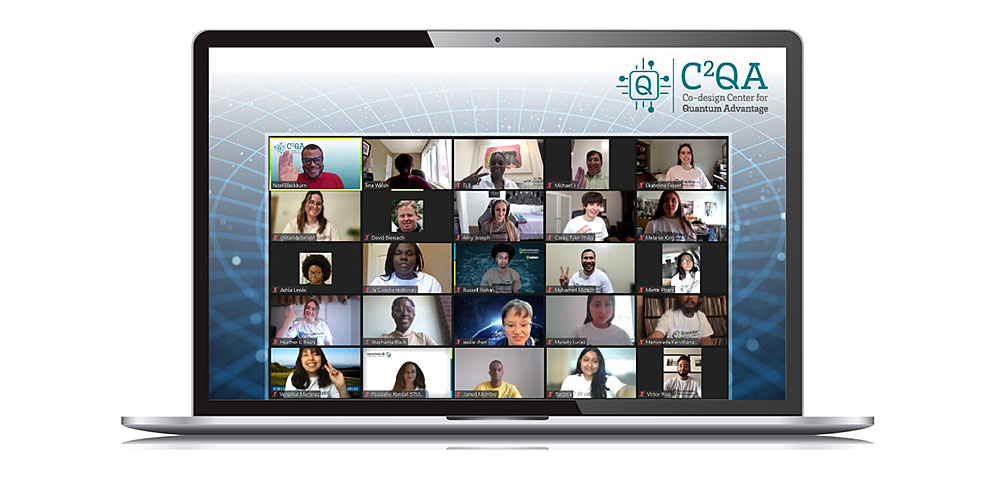C2QA Continues to Build the Quantum Workforce with Popular Summer Program
The intensive quantum computing summer school organized by the Co-design Center for Quantum Advantage invites a new class to dive into the quantum realm this year
March 10, 2023

C2QA's quantum computing summer school students are shown on a videoconference with the school's organizers. The program will be held virtually this year, but future sessions are planned to be held at Brookhaven National Laboratory.
Quantum information science (QIS) is an emerging research field that promises to revolutionize computation, engineering, communications, and many other aspects of both everyday life and fundamental science. Today, the hype of “quantum” is intriguing many young scientists and engineers as they look to enter the workforce, but many are left wondering how they can broach a field that is so complex and rarely taught before graduate school.
In 2021, an academic program launched by the Co-design Center for Quantum Advantage (C2QA)—a national QIS research center led by the U.S. Department of Energy’s (DOE) Brookhaven National Laboratory and comprised of several national labs, research centers, universities, and industry partners—was able to provide students with a better path towards the quantum workforce. The program, QIS 101, is a six-week-long quantum computing summer school for undergraduate students that focuses on building fundamental and practical skills.
In its third year, QIS 101 has built off its successes and learned from its challenges to optimize the course even more. The dense coursework, including 50 hands on projects, is spread out over a six-week period this year.
“Crucial feedback from the first group of students was that the four-week course was too short,” said David Biersach, a senior technology architect at Brookhaven Lab and one of the founders and instructors of QIS 101. “It was ‘too much too fast’ for students that were entirely new to quantum programming. Following their feedback, the next year we slowed the course down by expanding it to six weeks, adding more hands-on labs for the students. The feedback from this session was very encouraging – six weeks seemed to be the sweet spot.”
The program builds a strong foundation in QIS basics before branching out into more complex topics, like quantum machine learning. This foundation is also built with the fundamentals of classic scientific computing and essential coding.
“No quantum algorithm ever runs alone,” explained Biersach. “Quantum algorithms work alongside classical algorithms to answer science problems. I am most pleased when students, as a result of participating in QIS 101, begin to realize how important it is to learn how to code to do modern science.”
The program takes a blended approach, alternating between short lecture sessions and hands-on programming labs. About half of the initial cohort of students had no programming experience. They also all pursued different degrees, ranging from environmental science to engineering.
The summer school’s mission sticks true to C2QA’s mission, and it’s right in the center’s name—co-design. At C2QA, researchers are simultaneously designing hardware and software to achieve “quantum advantage,” which is the point when a quantum computer outperforms a classical one on a useful task. This multidisciplinary approach is integral to the QIS field as a whole, so Biersach and colleagues have replicated a multidisciplinary approach for students.
“QIS is a triple helix of physics, mathematics, and computer science,” Biersach said. “In most universities, these departments are all separate, and many science majors complete their degree without any computer programming experience. The quantum summer school integrates all of these fields in an introductory way.”
The quantum summer school encourages diverse group of students to work together, learn from each other, and solve problems by combining their different areas of expertise, much like QIS challenges are solved in the real world. The program divides students into small teams to study quantum computing applications for various physical systems. The students also worked with Qiskit software, an open-source framework for writing quantum programs that was developed by IBM, one of C2QA’s primary partners.
Of the course’s modest sized group of alumni, 12 students obtained follow-on undergraduate or graduate internships at Brookhaven Lab, other DOE labs, or STEM-focused businesses, seven students were accepted into a master’s program in STEM fields, and two were accepted into Ph.D. programs in STEM fields. These accomplishments are a bright reflection of the talented pool of applicants that are accepted into QIS 101 and what they will bring to this growing field.
“One of the most exciting outcomes of C2QA’s quantum summer school is that we are meeting the need to diversify the QIS workforce by training up talented jobseekers on a highly in-demand skillset,” said Kimberly McGuire, Chief Operations Officer for C2QA. “This is a unique opportunity for undergraduates and graduate students to transfer their learned experiences directly into a career at a national lab, in industry, or at an academic institution. We are closing the gap by addressing the need at the entry point where talented individuals and jobs meet.”
Workforce development is a major initiative at C2QA. Students of all ages and backgrounds who are interested in learning about quantum information science can browse ongoing opportunities on the C2QA website.
Applications are being accepted now until the March 24, 2023. To apply, students must be at least 18 years of age by the start date of the program, a U.S. citizen or Lawful Permanent Resident (green card holder) of the U.S., enrolled in an accredited institution of higher learning, or recently graduated (within one year of this application), and able to attend the full duration of the program.
Brookhaven National Laboratory is supported by the Office of Science of the U.S. Department of Energy. The Office of Science is the single largest supporter of basic research in the physical sciences in the United States and is working to address some of the most pressing challenges of our time. For more information, visit science.energy.gov.
Follow @BrookhavenLab on Twitter or find us on Facebook.
2023-21136 | INT/EXT | Newsroom









